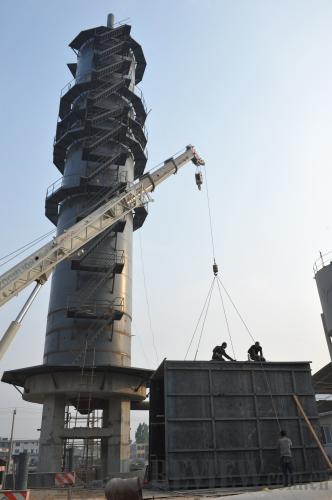|
 |
|
CLEANER PRODUCTION: Workers upgrade a shaft lime kiln on May 7, 2013 in Tangxian County, Hebei Province, in order to reduce emissions (XINHUA) |
Xin Chunying, Deputy Director of the Legislative Affairs Commission of the NPC Standing Committee, gave an example during the deliberation of the new Environmental Protection Law, saying that it needs 500,000-600,000 yuan ($80,150-96,180) to alleviate and control pollution on a daily basis when running an electricity generator complex with production capacity of 100,000 kW. But if the power plant shuts down its pollution treatment equipment and does nothing to protect the environment, it may only face a 10,000-yuan ($1,603) fine, she said.
"The phenomena in which the cost for observing environmental legislation is higher than violating laws is frequently seen, causing environmental pollution," Xin said.
The new law states that organizations in charge of environmental impact assessments and supervision would bear joint liabilities if they are found to have acted fraudulently.
According to the law, local officials may be demoted or sacked, if they are found guilty of misconduct, including covering up environmental wrongdoing, falsifying data or asking others to falsify data, failing to publicize environmental information that should be made public according to law or failing to give closure orders to enterprises that illegally discharge pollutants. If offenders' behavior constitutes a crime, they will be held criminally responsible.
The law introduces a daily-based fine system without upper limits to punish offenders. As a result, if an enterprise illegally discharges pollutants and refuses to make corrections as required by authorities, it may face a fine that accumulates daily. In the past, such enterprises received only a one-off fine.
Hu Jianmin, Vice President of state-owned power company China Huaneng Group, admitted that enterprises may feel the pressure of harsher punishments under the new law. "Companies that are diligently following regulations will be least affected," Hu said. He added that the new law will also bring about new opportunities to transform and upgrade enterprises as well as for the development of the clean energy market.
Zhang Guozhi, Deputy Director of the Environmental Protection Division with the Taiyuan Iron and Steel Group in north China's Shanxi Province, agreed. "Enterprises that observe environmental regulations usually invest more in reducing pollution, and stiff punishments will get rid of the inappropriate advantages available to polluters, acting as a protection for quality businesses," Zhang said.
Bie Tao, Deputy Director of the MEP's Department of Policies, Laws and Regulations, said that the amended law has impressed him with its support for the research and application of environment-related sciences and technologies, and financial aid to help develop the environmental protection industry.
However, officials and experts also stress that a strict law requires strict enforcement and the whole society should be encouraged to combat pollution.
"Good environmental legislation only gets you halfway there. It needs to be implemented," Vice Minister of Environmental Protection Pan Yue told Xinhua News Agency in an interview on April 28.
Calling the new law "the most powerful environmental legislation in the country," Pan said that it could still fail without strict enforcement.
Class litigations
The number of environmental pollution cases in China has grown more than 20 percent annually since 1996, according to Sun Youhai, Director of the China Institute of Applied Jurisprudence of the Supreme People's Court, China's highest judicial body, at a forum in Guiyang, southwest China's Guizhou Province, last July.
Sun said that more than 300,000 letters of accusations related to environmental pollution were filed from 2006 to 2010, but less than 1 percent ended up becoming court cases, mostly due to vague descriptions in the previous Environmental Protection Law that defines who is eligible to file lawsuits against polluters.
| 